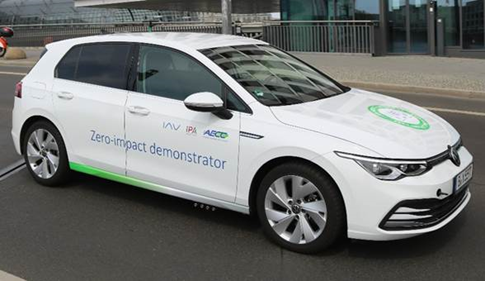[ad_1]
The European Affiliation for Emissions Management by Catalyst (AECC) offered its zero-impact emissions demonstrator automobile on the Vienna Motor Symposium, 27-29 April. The demonstrator reduces pollutant emissions throughout a variety of driving situations utilizing superior emission management applied sciences with an electrified combustion engine (48V delicate hybrid). On the identical time, Nicely-to-Wheel (WtW) CO2 emissions are considerably decreased by operating the car on an e-fuel.
The demonstrator relies on a Euro 6d C-segment automobile. The car powertrain consists of a turbocharged 4-cylinder, 1.5 liter gasoline engine with direct injection and a peak energy of 110 kW, geared up with variable valve timing and cylinder deactivation. The powertrain features a 48 V mild-hybrid system in P0 configuration (belt starter-generator, as much as 9 kW as motor, 12 kW as generator).
The unique emissions management system was changed by a complicated emission management system comprising a close-coupled electrically heated catalyst and three-way catalyst (TWC), underfloor gasoline particulate filter (GPF), a second TWC and an ammonia slip catalyst (ASC).
A testing program was co-funded by the Worldwide Platinum Group Metals Affiliation (IPA), and undertaken at engineering firm IAV in Berlin, Germany. E-fuel testing was carried out along with Aramco Abroad Firm.
An RDE check for cold-start was carried out right down to -10 °C, displaying the sensible mixture of applied sciences considerably reduces the preliminary cold-start peak for gaseous pollution in comparison with the already low Euro 6d ranges. Values of 3-10 mg/km have been measured on the tailpipe, considerably beneath the Euro 6 restrict of 60 mg/km.
Close to-zero emissions are achieved inside the first kilometer of driving, and maintained throughout all subsequent kilometers, impartial of the testing situations.
These ultra-low outcomes are additionally achieved for different species, e.g., ultrafine particles and ammonia. The PN10 degree was between 109 and 1010 particles/km—much like particle focus in ambient air. There may be an preliminary cold-start impact, impacted by ambient temperature, driving model and preliminary filter standing.
AECC mentioned that at a time when the way forward for inner combustion engine autos is being mentioned, these outcomes clearly present that it’s doable to proceed to cut back combustion engine emissions to zero-impact ranges. The info has been made obtainable to the Euro 7 course of and AGVES working group.
Sources
[ad_2]

